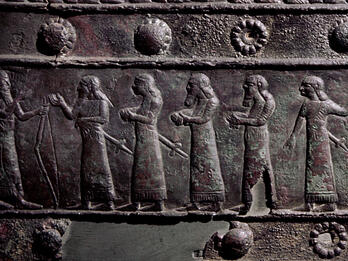Egypt’s Defeat and Conversion
16In that day, the Egyptians shall be like women, trembling and terrified because the Lord of Hosts will raise His hand against them. 17And the land of Judah shall also be the dread of the Egyptians; they shall quake whenever anybody mentions it to them, because of what the Lord of Hosts is planning against them. 18In that day, there shall be several towns in the land of Egypt speaking the language of Canaan and swearing loyalty to the Lord of Hosts; oneb shall be called Town of Heres.c
19In that day, there shall be an altar to the Lord inside the land of Egypt and a pillar to the Lord at its border.d 20They shall serve as a symbol and reminder of the Lord of Hosts in the land of Egypt, so that when [the Egyptians] cry out to the Lord against oppressors, He will send them a savior and champion to deliver them. 21For the Lord will make Himself known to the Egyptians, and the Egyptians shall acknowledge the Lord in that day, and they shall serve [Him] with sacrifice and oblation and shall make vows to the Lord and fulfill them. 22The Lord will first afflict and then heal the Egyptians; when they turn back to the Lord, He will respond to their entreaties and heal them.
23In that day, there shall be a highway from Egypt to Assyria. The Assyrians shall join with the Egyptians and Egyptians with the Assyrians, and then the Egyptians together with the Assyrians shall serve [the Lord].
24In that day, Israel shall be a third partner with Egypt and Assyria as a blessinge on earth; 25for the Lord of Hosts will bless them, saying, “Blessed be My people Egypt, My handiwork Assyria, and My very own Israel.”
Notes
I.e., the various districts of Egypt, which in Isaiah’s time were governed by hereditary princes.
Or “each one.”
Many Heb. mss. read heres, “sun,” which may refer to Heliopolis, i.e., Sun City, in Egypt. Targum’s “Beth Shemesh” (cf. Jer. 43.13) has the same meaning.
As a symbol of the Lord’s sovereignty over Egypt.
I.e., a standard by which blessing is invoked.
Credits
Published in: The Posen Library of Jewish Culture and Civilization, vol. 1.



